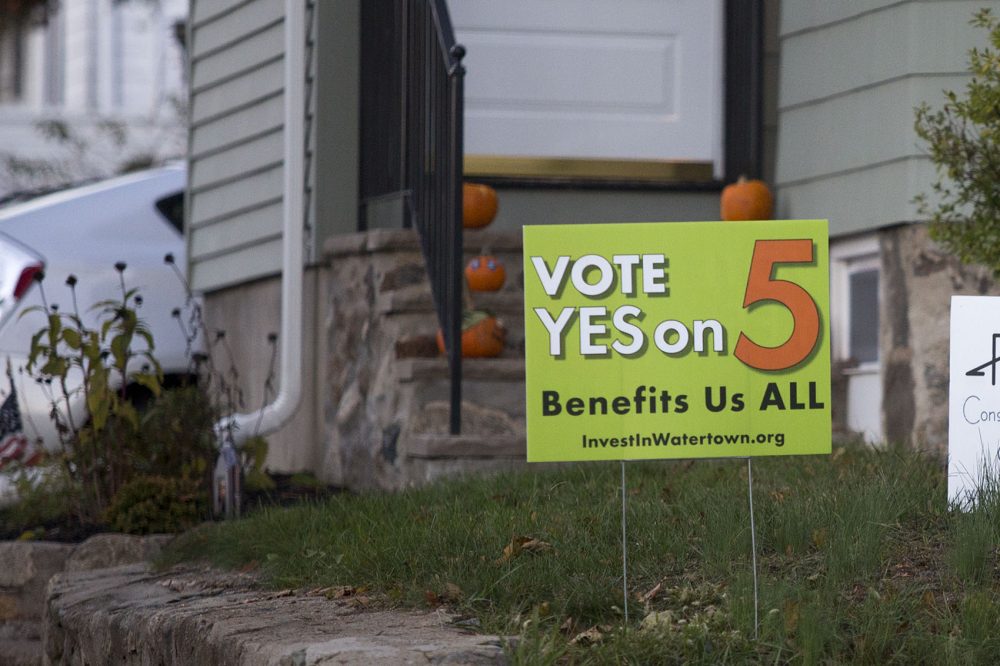Advertisement
In Boston, It's Question 5 (Yes, There's A 5): What To Know About The Community Preservation Act

Slots, charters, chickens and weed.
As Election Day nears in Massachusetts, there's been a lot of discussion and debate on the four statewide ballot questions, but in Boston and 15 other communities, there's another noteworthy measure facing voters.
Those 16 municipalities are voting on whether to adopt the Community Preservation Act (CPA), which would add a small property tax surcharge to residents' tax bills to fund local initiatives on affordable housing, open space and historic preservation. In Boston, it's Question 5 on the ballot.
Let's break it down, FAQ-style.
What's the CPA?
It's a state law, signed in 2000 by then-Gov. Paul Cellucci, a Republican, that allows municipalities to add a real estate tax surcharge that's earmarked for a local community preservation fund.
Any proposed surcharge can't exceed 3 percent of the assessed value of a property. (There are some exemptions; more on those below.) State matching funds equal to some percentage of the local tax revenue incentivize communities to join the program. (More on that below, as well.) And there are guidelines on the projects towns and cities can fund.
The CPA is something municipal voters must approve via a referendum. A measure gets on a local ballot through a signature drive, or if local elected officials vote to put it before residents.
OK. Do I need to care about it?
It depends on where you live! Here are the 16 places voting on the CPA this election: Amesbury, Billerica, Boston, Chelsea, Danvers, East Bridgewater, Holyoke, Hull, Norwood, Palmer, Pittsfield, Rockland, South Hadley, Springfield, Watertown and Wrentham.
So, maybe you don't live in one of those 16, but since it was enacted, 161 communities have adopted CPA statewide.
Yeah, I'm a Boston resident. And I haven't voted early. So what's the proposal for me?
The Boston proposal is a 1 percent property tax surcharge.
Joe Kriesberg, chair of the Yes for a Better Boston committee, said the average homeowner in the city (with a property that's assessed at $500,000) would see their tax bill increase by $24 per year.
But, as Kriesberg told me, "nobody really cares what the average is. It matters what you're paying." To that end, the city of Boston has created a CPA calculator, where you can plug in your address and find out how much you'd owe.
All told, Kriesberg's group estimates CPA passage would currently bring $20 million a year to Boston — $10 million from commercial properties, $6 million from residential properties and $4 million in state matching funds.
Give me some more specifics. You mentioned exemptions and state matching. And who decides on what projects would be funded?
1. Exemptions: Well, it depends on the specific proposal, but broadly, in most of the 16 local measures this year, the first $100,000 of the value of a property is exempt, and then certain residents — low-income families, and low- to moderate-income seniors — can also apply for waivers to be exempt from the surcharge entirely. (Here's more on Boston's exemptions.)
2. Match: The state matching part of CPA is a bit controversial right now. Fees on real estate transactions go into the Community Preservation Trust Fund, which for many years paid a 100 percent match, but the fund has struggled to remain robust over the years, and as more cities and towns adopt CPA, there's less matching state money to go around.
As Amesbury Mayor Ken Gray, who opposes CPA adoption for his city, told reporter Christian Wade, "The match used to be a good deal. Ten years ago, when it was still a 100 percent state match, it might have made sense."
Boston's entrance could further deplete the matching pool. Kriesberg admitted it's a source of friction, but expressed hope that if Boston adopts CPA, it would lead to a legislative push to increase the state matching mechanism.
Advertisement
3. Who decides: If a city or town adopts CPA, an appointed committee would make recommendations on projects to fund. In Boston, a five- to nine-person panel would recommend projects to the City Council, so it'd be a public process.
Has Boston voted on CPA before?
Yeah, this is actually a second go-around for the city, whose residents voted against adopting a 2 percent CPA surcharge in November 2001. The vote was 57-43 against.
Seeing more favorable political and economic conditions (and a younger, more progressive electorate in a presidential election year), proponents sought to try again in 2016.
They also ratcheted down the surcharge ask, from 2 percent to 1 percent.
Looking around the state and the country at successful tax-raising efforts, Kriesberg said: "There seemed to be a tipping point in terms of the size of the increase, and when voters start to say, 'Wait a minute, that's too big a bite.' " He added: "When you start to get north of $40, it's a tougher and tougher effort."
The Boston City Council voted 12-1 in April to get CPA on this fall's municipal ballot. Mayor Marty Walsh, a Democrat who had indicated his backing of CPA as a candidate, is now actively campaigning for it.
Boston's big and growing, with a big and worrying housing affordability problem. Would $20 million a year really make a difference?
When I asked this question, Kriesberg pushed back on the skepticism. He said it's a decent amount of money that could also leverage federal and private funds. And he said CPA could be one of several steps the city takes to address affordability concerns, such as reforming the so-called inclusionary development policy. "It's not the only thing we're doing, but it's an important pool of resources," he said.
OK, just recap this for me: What are the arguments for or against CPA?
Kriesberg says it's a "modest" surcharge that would give the city more funding for affordable homes, to improve parks, and to preserve the "buildings and monuments that make Boston special."
Opponents don't want a higher tax bill for not-yet-determined projects.
City Councilor Bill Linehan, who cast the lone dissenting vote against putting CPA on the Boston ballot, told our Newscast Unit last month he worries about further burdening property owners.
Chip Faulker -- director of communications for Citizens for Limited Taxation, which he says has opposed CPA since it was enacted — said Massachusetts already has "very high" property taxes, and "putting in the CPA is like putting a tax on top of an already-high property tax. And that was unconscionable."
And Faulkner said municipalities don't need the CPA mechanism.
"Let's say a community wants to have money for a specific project," he said. "Then they can put a Proposition 2 1/2 override on the ballot. And that way you know your tax dollars are going for a specific purpose."
Kriesberg admits it can be a tough sell.
"Any time you ask for a tax increase, you know it's going to be a big lift, you know it's going to be hard," he said. "There are a lot of voters who are just going to say no to a tax increase automatically and people are, I think, rightfully and appropriately skeptical. The burden is on us to make the case."
All right, last question: How come I haven't heard more about this?
Those four statewide ballot questions I mentioned at the top (and the presidential race, of course) are taking up a lot of attention.
Plus, in Boston, there's no organized, public opposition to Kriesberg's group. I asked him if that worries him, that the first voters might be seeing of a proposed tax hike is in the ballot booth.
On balance, he said, he's happy the measure has widespread support from political and business leaders in Boston, but that educating voters "has been a challenge."
This post was updated to provide more detail on the state match. WBUR's Bob Shaffer contributed reporting.
This article was originally published on November 02, 2016.
This segment aired on November 2, 2016.
